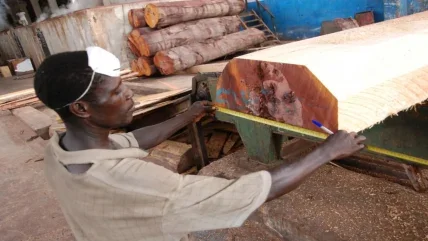
Ghana is set to start issuing Forest Law Enforcement Governance and Trade (FLEGT) licences for exports to the EU and UK in 2024.
The news came out of a September meeting in Brussels of the Joint Monitoring and Review Mechanism (JMRM) body for the country’s FLEGT Voluntary Partnership Agreement (VPA) with the EU. The JMRM is a bilateral platform to track progress of the VPA, which, when fully implemented to the satisfaction of governments of both the EU and Ghana, enables the start of licensing.
The meeting agreed a joint action plan, setting out the final steps to be taken to “complete Ghana’s readiness to issue FLEGT licences”. According to Forestry Commission of Ghana director Chris Beeko, this involves Parliament giving the green light to the ratification of Timber Utilisation Contracts. These are entered into by timber rights holders and the Ghanaian Ministry of Forestry and must be ratified by Parliament to comply with legal requirements. This process is anticipated to be completed by the year end, before Parliament rises. The JMRM will then convene to document this and issue a communiqué on the completion of the Ghana FLEGT licensing readiness process.
“This is tentatively scheduled for February 2024,” said Mr Beeko. “The communiqué on Ghana’s readiness will then trigger the processes in the EU to list the Ghana FLEGT licence in their systems [as the next step] towards the start of licensing.”
In the EU, under its new Deforestation Regulation (EUDR), FLEGT licences will be accepted as proof of Ghanaian timber and wood products legality.
Under the UK Timber Regulation, FLEGT licences from Indonesia, the only country so far to issue them, exempt its timber from further import legality due diligence. They are also accepted as proof of legality and sustainability under UK government procurement policy. The same is expected to be the case for Ghanaian licences.
“We are currently moving forward a transposed agreement, so there can be a Ghana-UK FLEGT VPA,” said Mr Beeko. “With this, a similar treatment of the FLEGT licence as pertains under the EU agreement will apply to the UK market. Discussions are under way to initial this before the end of November.”
Ghana signed its VPA with the EU in 2009. It committed the country to establishing a nationwide Timber Legality Assurance System (TLAS) to ensure that timber products comply with national laws and regulations.
The VPA also entails Ghana promoting sustainable forest management and measures for the preservation of forest ecosystem services, such as carbon storage and protection of soil and water quality and biodiversity.
Other aspects include improvement of forest and timber sector working conditions and involvement of local communities in forest management decision making.
According to the Forestry Commission of Ghana, the VPA also increases transparency in the forest sector and “stimulates continuous improvement in forest governance”.
“It galvanises stakeholders around a common objective of timber legality and sustainable forest management,” says the Commission. “It has enabled an inclusive approach to policy-making and promoted ownership of forest policy, [leading] to a transformational shift in the forest sector regulatory environment.”
The end result, it maintains, is consolidation of Ghana’s position as a “front runner in combatting illegal logging to ensure legal timber supply for both domestic and international markets”.
Another outcome of the VPA is Ghana’s internationally highly regarded electronic timber tracking system, which supports the TLAS. This was originally intended simply to monitor and verify chain of custody “from stump to timber market”. But the Forestry Commission says it is delivering other benefits.
“The system has taken data collection to the next level, supporting decision making on forest resources via its dashboards and analytical tools,” it says. “Any stakeholder, including non-technical users, can now access analytics to better understand the current forest sector situation and trends.”
Commenting on latest developments, European Commissioner for International Partnerships Jutta Urpilainen said: “Over the years, we have witnessed the remarkable dedication of Ghana’s government and forest sector to sustainable forest management and combatting illegal logging. In cooperation with European partners, this has brought FLEGT licensing within our reach. It underscores the power of international co-operation in addressing critical global challenges such as deforestation and illegal logging.”





